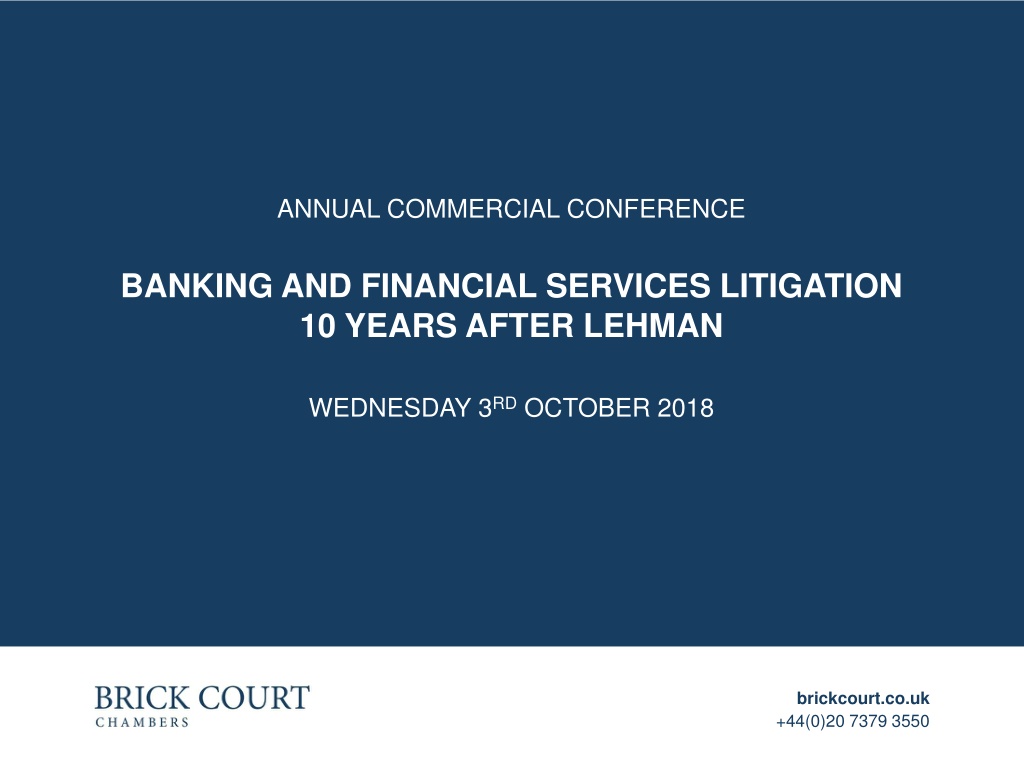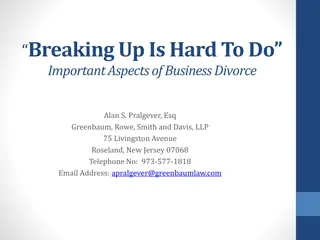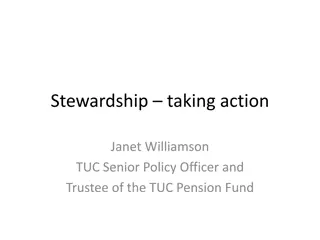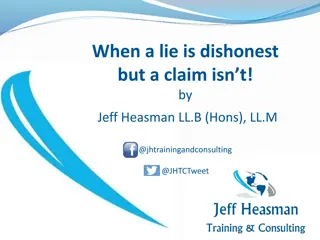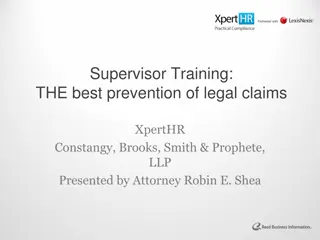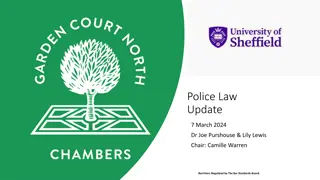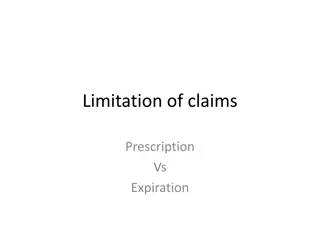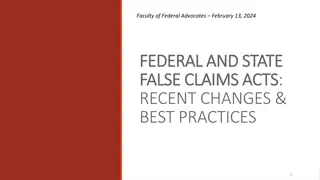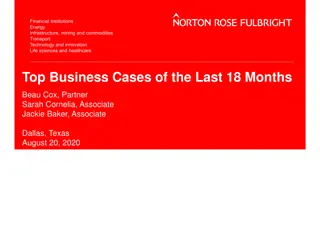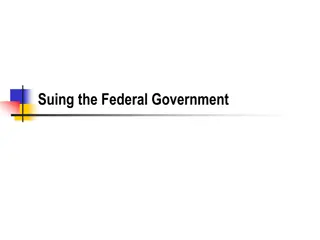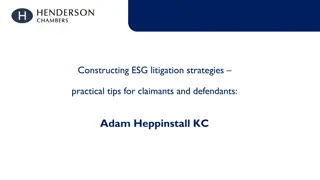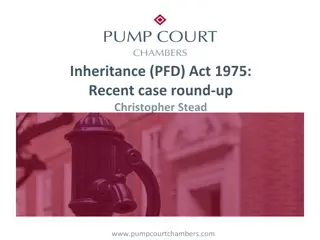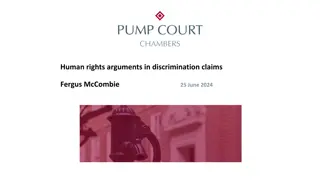Recent Developments in Shareholder Claims and Legal Issues
Explore the latest insights on shareholder claims and legal issues in the banking and financial services sector, including significant litigation cases and key considerations regarding causes of action, reflective loss, procedural routes, and privilege challenges. Stay informed about important judgments and discussions shaping the shareholder litigation landscape.
Download Presentation

Please find below an Image/Link to download the presentation.
The content on the website is provided AS IS for your information and personal use only. It may not be sold, licensed, or shared on other websites without obtaining consent from the author. Download presentation by click this link. If you encounter any issues during the download, it is possible that the publisher has removed the file from their server.
E N D
Presentation Transcript
ANNUAL COMMERCIAL CONFERENCE BANKING AND FINANCIAL SERVICES LITIGATION 10 YEARS AFTER LEHMAN WEDNESDAY 3RDOCTOBER 2018 brickcourt.co.uk +44(0)20 7379 3550
SHAREHOLDER CLAIMS Some Legal Issues Helen Davies QC and Kyle Lawson brickcourt.co.uk +44(0)20 7379 3550
SHAREHOLDER CLAIMS brickcourt.co.uk +44(0)20 7379 3550
SHAREHOLDER CLAIMS brickcourt.co.uk +44(0)20 7379 3550
SHAREHOLDER CLAIMS Causes of Action RBS Rights Litigation section 90 FSMA Tesco Litigation section 90A FSMA Lloyds/HBOS GLO common law negligent misstatement and equitable duty on Directors to provide sufficient information Sharp v Blank [2015] EWHC 3220 (Ch), judgment of Nugee J relating to scope of duties owed by Directors to shareholders. brickcourt.co.uk +44(0)20 7379 3550
SHAREHOLDER CLAIMS Reflective Loss Pilmer v Duke Group Limited [2001] HCA 31 brickcourt.co.uk +44(0)20 7379 3550
SHAREHOLDER CLAIMS Procedural Routes Part 19 GLO RBS Rights Litigation and Lloyds/HBOS Shareholder GLO Greenwood v Goodwin [2013] EWHC 2785 (Ch), judgment of Hildyard J ordering GLO in RBS Rights Issue Litigation. Greenwood v Goodwin [2014] EWHC 227 (Ch), judgment of Hildyard J in relation to principles to apply in apportioning liability of Claimants for common costs. brickcourt.co.uk +44(0)20 7379 3550
SHAREHOLDER CLAIMS Some Problems with Privilege: Sharp v Blank (Lloyds/HBOS Litigation) [2015] EWHC 2681 (Ch) when can a company assert privilege against its shareholders? RBS Rights Issue Litigation[2016] EWHC 3161 (Ch) who is the client? SFO v ENRC [2017] EWHC 1017 (QB) (Andrews J) and [2018] EWCA Civ 2006 (Court of Appeal) where are we now? brickcourt.co.uk +44(0)20 7379 3550
SHAREHOLDER CLAIMS A last word on costs: Sharp v Blank [2015] EWHC 2685 (Ch), judgment of Nugee J requiring exchange of Precedent H budgets. Sharp v Blank [ 2017] EWHC 141 (Ch), judgment of Nugee J ordering costs case management conference The RBS Rights Issue Litigation [2017] EWHC 463 (Ch), judgment of Hildyard J ordering Claimants to disclose identity of funders. The RBS Rights Issue Litigation [2017] EWHC 1217 (Ch), judgment of Hildyard J ordering one group of funders to provide security for costs. brickcourt.co.uk +44(0)20 7379 3550
ANNUAL COMMERCIAL CONFERENCE BANKING AND FINANCIAL SERVICES LITIGATION 10 YEARS AFTER LEHMAN WEDNESDAY 3RD OCTOBER 2018 brickcourt.co.uk +44(0)20 7379 3550
JURISDICTION ISSUES Sir Richard Aikens and Edward Ho brickcourt.co.uk +44(0)20 7379 3550
JURISDICTIONAL ISSUES: INTRODUCTION Since 2008 there have been hundreds of banking and financial cases in the English courts and in London arbitration. Jurisdictional disputes often arise. Banking and financial services parties are usually sophisticated and have elaborate contractual terms, such as the ISDA Master Agreement, which will usually include: Governing law clauses Jurisdiction clauses of one sort or another Reciprocal exclusive jurisdiction clauses o Asymmetrical exclusive jurisdiction clauses o Non-exclusive jurisdiction clauses o What form do the jurisdictional disputes take? brickcourt.co.uk +44(0)20 7379 3550
WHAT JURISDICTIONAL PROBLEMS ARISE IN BANKING AND FINANCIAL SERVICES LITIGATION? Jurisdictional issues we will concentrate on: Challenges to a claim that the English court should hear the dispute. We will concentrate on the Recast Brussels 1 Regulation rules as the background. In particular note: Art. 25: Effect of the parties having a jurisdiction ( choice of court ) agreement in their contract. What about asymmetric jurisdiction clauses and non-exclusive jurisdiction clauses? o Art. 31(2): obligation of non-chosen court to stay proceedings in favour of the chosen court. o Art. 29(1) (Lis pendens) and its relationship with Art.31(2) o Conflicting jurisdiction provisions e.g. in several contracts? Which one wins? o Use of expert evidence on foreign law in jurisdiction clause disputes. o Anti-suit injunctions in the context of arbitrations Where are we with West Tankers now? o What is going to happen to the Brussels 1 Regulation regime if Brexit goes ahead? brickcourt.co.uk +44(0)20 7379 3550
Jurisdiction under Recast Brussels I No Reg does not apply Scope:Is the claim a civil and commercial matter ? Art 1 Yes Court has JRN (even if there are parallel/related proceedings abroad: Commerzbank v Liquimar Tankers [2017] EWHC 161 (Comm) at [78], Rec. 22) Yes Exclusive Jurisdiction - Is this a special case where (regardless of domicile) the Court has exclusive jurisdiction? Art 24 (formerly Art 22) Yes Is Jrn Agreement exclusive? No No Yes Jurisdiction Agreement - Is there a valid jurisdiction agreement? Art 25 (formerly Art 23) Court must stay claim Is there an excl. JRN agreement or excl. basis for JRN in favour of a (seized) MS court? Art 31(3)/25(4) Yes No Yes Submission: Has the defendant submitted to the jurisdiction? Art 26 (formerly Art 24) No Court has JRN Yes Was the English court first seised? Art 29/30 No Yes General Rule Domicile: Is the defendant domiciled in England & Wales? Art 4 (formerly Art 2) No Court must stay claim Are there parallel proceedings in another MS? Art 29 Yes No Yes Special Rules: Do any of the special rules on jurisdiction confer jurisdiction on the English court? Art 7-8 (formerly Arts 5-6) No Yes Are there related proceedings in another MS? Art 30 No Yes Court may stay claim Insurance/consumer/employment contract claims: Do any of the special rules on jurisdiction apply? Art 10-23 (formerly Arts 8-21) No Yes No Are there parallel/related proceedings in a non-MS? Art 33/34 National Law: If D is not domiciled in a member state, does the court have jurisdiction under English law (e.g. at common law)? Art 6 (formerly Art 4) brickcourt.co.uk +44(0)20 7379 3550 Court has JRN No
THREE AREAS TO NOTE [1] THE ARBITRATION EXCEPTION Arbitration remains outside the scope of Brussels I: see Art 1(2)(d) Recast. A new Recital 12 clarifies the scope of the exception. 3 key points: A ruling on the validity of an arbitration agreement is not a judgment within the scope of the Regulation. Reverses The Wadi Sadur [2009] EWCA Civ 1397, which was wrongly decided. But if a court decides an arbitration clause is invalid, its substantive decision on the merits is a Regulation judgment. Recital 12(4) includes a guide as to the sort of proceedings which fall within the arbitration exception brickcourt.co.uk +44(0)20 7379 3550
THREE AREAS TO NOTE [2] JURISDICTION AGREEMENTS (ART 25) Art 25.1: Requirement that one of the parties to the jurisdiction agreement is domiciled in a Member State is abolished by the recast Regulation. Art 25.1 & Recital 20 : Validity of the jurisdiction agreement is to be determined by the law of the jurisdiction chosen including its conflicts of law rules. Art 25.5: Confirmation that the validity of a jurisdiction agreement is independent of the validity of the substantive contract. Doctrine of severability applies. brickcourt.co.uk +44(0)20 7379 3550
THREE AREAS TO NOTE [3] JURISDICTION AGREEMENT & PARALLEL PROCEEDINGS (ART 31) Article 27(1) Old Brussels I: Where proceedings involving the same cause of action and between the same parties are brought in the courts of different Member States, any court other than the court first seised shall stay its proceedings This gave rise to the problem of the Italian Torpedo : Gasser v MISAT(C-116/02) Part I of the solution is Article 31(2) - (3) Recast: 2. agreement as referred to in Article 25 confers exclusive jurisdiction is seised, any court of another Member State shall stay the proceedings until such time as the court seised on the basis of the agreement declares that it has no jurisdiction under the agreement. Without prejudice to Article 26, where a court of a Member State on which an 3. accordance with the agreement, any court of another Member State shall decline jurisdiction in favour of that court Where the court designated in the agreement has established jurisdiction in brickcourt.co.uk +44(0)20 7379 3550
THREE AREAS TO NOTE [3] JURISDICTION AGREEMENT & PARALLEL PROCEEDINGS (ART 31) - CONTINUED Article 29(1) Recast: Without prejudice to Article 31(2), where proceedings involving the same cause of action and between the same parties are brought in the courts of different Member States, any court other than the court first seised shall of its own motion stay its proceedings until such time as the jurisdiction of the court first seised is established. Recital 22 Recast (and see Commerzbank Aktiengesellschaft v Liquimar Tankers Management Inc[2017] EWHC 161 (Comm) at para 78): the court first seised should be required to stay its proceedings as soon as the designated court has been seised and until such time as the latter court declares that it has no jurisdiction under the exclusive choice-of-court agreement. This is to ensure that, in such a situation, the designated court has priority to decide on the validity of the agreement and on the extent to which the agreement applies to the dispute pending before it. The designated court should be able to proceed irrespective of whether the non-designated court has already decided on the stay of proceeding brickcourt.co.uk +44(0)20 7379 3550
JURISDICTION AGREEMENT: PROBLEM AREAS Problem 1: Non-Exclusive Jurisdiction Agreements What exactly is a non-exclusive jurisdiction agreement? What is the effect of such an agreement under the Recast Regulation? Problem 2: Asymmetric Jurisdiction Agreements Are they valid jurisdiction agreements for the purposes of Art 25 Recast? What is the effect of such an agreement under the Recast Regulation? Problem 3: Competing Jurisdiction Agreements How do you resolve the conflict? brickcourt.co.uk +44(0)20 7379 3550
NON-EXCLUSIVE JURISDICTION AGREEMENTS: WHAT ARE THEIR EFFECT? The classic view is that there is a clear divide between exclusive and non-exclusive jurisdiction agreements: An exclusive jurisdiction agreement obliges parties to refer disputes that fall within the scope of the clause to a specific court. A non-exclusive jurisdiction agreement obliges parties to submit to the jurisdiction of one or more specific courts if proceedings are brought in that court, but does not compel the parties to bring proceedings in that court. However the view that there is a clear divide is increasingly recognised as too simplistic. See e.g.BNP Paribas SA v. Anchorage Capital Europe LLP[2013] EWHC 3073 (Comm) at [88] (Males J.): the terms exclusive and non-exclusive themselves are merely convenient labels I prefer to ask the question whether the commencement and pursuit of the foreign proceedings in question are things which a party has promised not to do brickcourt.co.uk +44(0)20 7379 3550
NON-EXCLUSIVE JURISDICTION AGREEMENTS: WHAT ARE THEIR EFFECT? The true effect of a jurisdiction agreement depends on its proper construction. Contrast: Deutsche Bank AG v. Highland Crusader [2010] 1 WLR 1023 (CA) This agreement shall be governed by and construed in accordance with the laws of England. Buyer and seller hereby irrevocably submit for all purposes of or in connection with this agreement and each transaction to the jurisdiction of the courts of England Nothing in this paragraph shall limit the right of any party to take proceedings in the courts of any other country of competent jurisdiction. BNP Paribas SA v. Anchorage Capital Europe LLP[2013] EWHC 3073 (Comm) This Agreement shall be governed by, and construed in accordance with, English Law and [Anchorage] irrevocably submit to the jurisdiction of the English courts in respect of any matter arising out of this Agreement, or our services to or Transactions with you under this Agreement. To similar effect as BNP Paribas, see also: Global Maritime Investments v. O.W. Supply & Trading A/S [2015] EWHC 2690 (Comm) (Teare J.) at paras 53-54; Perkins v. Ghaddar [2018] EWHC 1500 (Comm)(Bryan J.) obiter at para 127. brickcourt.co.uk +44(0)20 7379 3550
NON EXCLUSIVE JURISDICTION AGREEMENTS AND THE RECAST REGULATION The significance of the presumption of exclusivity in Art 25(1) Recast is open to debate: If the parties, regardless of their domicile, have agreed that a court or the courts of a Member State are to have jurisdiction to settle any disputes which have arisen or which may arise in connection with a particular legal relationship, that court or those courts shall have jurisdiction Such jurisdiction shall be exclusive unless the parties have agreed otherwise All jurisdiction agreements engage Art 25 Recast, see e.g. UCP Plc v Nectrus Ltd [2018] EWHC 380 (Comm) at para 39 Furthermore UCP Plc v Nectrus Ltd establishes that where the Court has jurisdiction under Art 25 Recast, even if via a non-exclusive jurisdiction agreement, it cannot stay proceedings in favour of a Non-Member State Court under Arts 33 or 34 Recast: see paras 39-45 of the judgment. However the effect of non-exclusive agreements in relation to parallel proceedings in a Member State is more complex. Art 31(2) Recast provides: Without prejudice to Article 26, where a court of a Member State on which an agreement as referred to in Article 25 confers exclusive jurisdiction is seised, any court of another Member State shall stay the proceedings until such time as the court seised on the basis of the agreement declares that it has no jurisdiction under the agreement. brickcourt.co.uk +44(0)20 7379 3550 So what happens if the agreement confers non-exclusive jurisdiction?
ASYMMETRIC JURISDICTION AGREEMENTS Asymmetric jurisdiction clauses are clauses which contain different provisions regarding jurisdiction depending on whether the proceedings are initiated by one party to the agreement rather than the other. They are widely used in international financial markets. Example clause The Loan Market Association Single Currency Term Facility Agreement: (A) The courts of England have exclusive jurisdiction to settle any disputes . (B) The Parties agree that the courts of England are the most appropriate and convenient courts to settle Disputes and accordingly no Party will argue to the contrary. (C) This Clause is for the benefit of the Finance Parties only. As a result, no Finance Party shall be prevented from taking proceedings relating to a Dispute in any other courts with jurisdiction. brickcourt.co.uk +44(0)20 7379 3550
ASYMMETRIC JURISDICTION AGREEMENTS UNDER THE RECAST REGULATION A number of French authorities (which have been followed in Bulgaria and Poland) suggest asymmetric jurisdiction agreements do not engage Art 23 Brussels / Art 25 Recast: see e.g. Mme X v. Soci t Banque Priv Edmond de Rothschild 13, First Civil Chamber, 26 September 2012, Case No. 11-2602 Those cases have not been followed here. In Commerzbank Aktiengesellschaft v Liquimar Tankers Management Inc [2017] EWHC 161 (Comm) at paras 79-81 Cranston J. concluded asymmetric agreements do engage Art 25 Recast: This argument seems to overlook that in these asymmetric jurisdiction clauses the parties have designated the English court as having exclusive jurisdiction when the defendants sue. There is nothing in Article 25 that a valid jurisdiction agreement has to exclude any courts, in particular non EU Courts. Article 17, penultimate paragraph, of the Brussels Convention recognised asymmetric jurisdiction clauses. To my mind it would need a strong indication that Brussels 1 Recast somehow renders what is a regular feature of financial documentation in the EU ineffective Liquimar Tankers also establishes that asymmetric jurisdiction agreements benefit from the lis pendens provision in Art 31(2) Recast: see para 62-76. brickcourt.co.uk +44(0)20 7379 3550
COMPETING JURISDICTION CLAUSES: HOW TO DEAL WITH THEM. A MATTER OF CONSTRUCTION. DEUTSCHE BANK AG V COMUNE DI SAVONA [2018] EWCA CIV 1740 The problem of competing jurisdiction clauses has arisen in the courts several times. Most recent case is: Deutsche Bank AG v Comune di Savona [2018] EWCA Civ 1740 (27 July 2018). The bank and the Comune di Verona had entered into a Convention with an Italian law and jurisdiction clause; and a contract based on 1992 multicurrency ISDA Master Agreement terms with English law and English jurisdiction clause. There were then a number of further interest rate swaps transactions. The Italian Court of Auditors questioned the validity of the interest rate swaps transactions that the Comune of Verona had entered into with the bank and proceedings were started in a Verona court by the Comune di Verona. The bank responded with proceedings for declarations in the Commercial Court relating to the validity of the interest rate swaps transactions. The Comune applied to the English Court to stay the English proceedings under Arts. 25 and 31(2) of the recast Brussels 1 Regulation, on the ground that the particular legal relationship in connection with which the dispute between the parties had arisen was the Convention, in which they had agreed the exclusive jurisdiction of the Milan courts. Both sides served (without seeking permission) extensive expert evidence on Italian law as to the proper construction and effect of the Italian governing law and jurisdiction clause. brickcourt.co.uk +44(0)20 7379 3550
DEUTSCHE BANK CASE (CONTINUED). At first instance HHJ Wakeman QC took account of the foreign law evidence and held that the dispute was about the bank s role as advisor and it fell more naturally within the Italian jurisdiction clause in the Convention. So he applied Arts 25 and 31(2) of the recast Brussels 1 Regulation and stayed the English proceedings in favour of the Italian ones. His decision was reversed by the CA. Longmore LJ gave the leading judgment. He noted: The first step is to analyse closely the nature of the dispute to see, (if possible), under which of two (or possibly more) inter-related contractual agreements the dispute actually arises [3]: following Trust Risk Group SpA v AmTrust Europe Ltd [2016] 1 All ER (Comm) 325 at [48] per Beatson LJ. Theoretically a dispute could fall within the ambit of more than one jurisdiction clause. In that case the true position may be that the parties have agreed that either jurisdiction clause can apply rather than one to the exclusion of the other: [4]. In the context of Art. 25 of the recast Brussels 1 Regulation, the aim of the exercise is to find out the particular legal relationship in connection with which the dispute in issue has risen. The swaps contracts were separate contracts from the Convention and disputes arising from them were governed by the jurisdiction clauses in those contracts: [23]. brickcourt.co.uk +44(0)20 7379 3550
THE USE OF EXPERT EVIDENCE OF FOREIGN LAW WHEN THERE ARE ISSUES AS TO THE CONSTRUCTION OF JURISDICTION CLAUSES IN A CONTRACT GOVERNED BY A FOREIGN LAW At [15] Longmore LJ spoke of considerable unease concerning the proliferation of expert evidence of foreign law on jurisdiction applications . He was right to do so! As he reminded practitioners, where the issue is the construction of a contract or clause governed by a foreign law, the expert evidence should be confined to the issue of whether, and if so, how, the foreign law differs from English law on principles of construction of contracts. This is well established law: see e.g. Vizcaya Partners Ltd v Picord [2016] 1 All ER (Comm) at [60] per Lord Collins, who cited the rules as set out in Dicey: paras 9-19 and 32-144. Arguments based on how the highestcourt in the foreign jurisdiction would have interpreted the foreign jurisdiction clause are misplaced: per Longmore LJ at [15]. The task of the English court is merely to inform itself of any relevant different principles of construction there might be in the foreign law and, armed with such information, look at both jurisdiction clauses and decide whether the English claim falls within the English clause. That should be a comparatively straightforward exercise . Correct, with respect! There appear to be no CPRs on the issue of expert evidence on interlocutory disputes such as jurisdiction and the Court urged the Commercial Court Users Committee to consider this so as to provide in the Guide that such evidence could only be adduced with permission: see [16] brickcourt.co.uk +44(0)20 7379 3550
WHAT HAPPENS TO JURISDICITON ISSUES AFTER BREXIT IF IT OCCURS? It appears to be agreed between the EU and the UK (at least in principle) that there will be a transition period from 30.3.19 to 31.12.20. Under the Joint Statement of the EU/UK negotiators of July 2018, Art.63 in respect of all legal proceedings instituted before the end of this period in the UK and in Member States in situations involving the UK and those related (ie covered by Arts, 29, 30 and 31 of the recast Brussels 1 Regulation), the provisions of that Regulation will continue to apply. As at present, there is no agreement on what the jurisdictional rules will be as between the UK and EU Member States thereafter. BUT generally accepted that in the absence of agreement: Recast Brussels 1 Reg (and old Brussels 1 Reg) will cease to have effect Lugano 2007, (which governs the jurisdictional rules as between Member States and Switzerland, Norway and Iceland (ie EFTA states minus Lichtenstein) will cease to have effect. (This is because it has force in the UK as an EU Act by council decision of 15.12.2007: [2007] OJ L339/3. Once cease to be a Member State, it has no force) brickcourt.co.uk +44(0)20 7379 3550
WHAT ARE THE OPTIONS POST 2020? The default position: Possible that the Brussels Convention could still apply? Section 2(1) of the CJJA 1982 giving the Brussels Convention the force of law in the UK is still in force. The Brussels Convention still exists as an international law instrument. (Indeed it is relevant to various territories not covered by the recast Brussels 1 Regulation). Arguably: It would still apply to all EU Member States, even those who joined after 2000 (when Brussels 1 Reg came into force). But a technical argument based on the wording of the Convention. Still applies to all existing EU Member States extant in 2000. Stronger. BUT no argument that the issue would have to be decided by the CJEU! Everyone appears to agree that once Lugano 2007 ceases to have effect, Lugano 1988 would not revive. Art 69(6) of Lugano 2007 stipulated that it shall replace Lugano 1988, so, on correct construction of the latter international law treaty, it superseded the earlier one which thereby ceased to exist. So no existing jurisdiction/enforcement regime as between the UK and Switzerland, Norway and Iceland. brickcourt.co.uk +44(0)20 7379 3550
WHAT MIGHT BE BEST JURISDICTION REGIME POST BREXIT? There are arguments both ways as to what, in principle, is best. (1): Try and get a bilateral treaty between the EU/UK to make the recast Brussels 1 Reg the jurisdiction/recognition and enforcement regime. (Precedent in the EU-Denmark Treaty of 2005 bringing Denmark into Brussels 1). Give the treaty the force of law by amending the CJJA 1982. Carry on as before? The domestic political difficulty might be having to accept CJEU jurisdiction on interpretation - and no anti-suit injunction regime. Alternatively (as suggested by Prof Adrian Briggs): go back to the CPR jurisdiction rules. Wider jurisdiction (not to be regarded as exorbitant per Lord Sumption) so no longer restrained by the defendant s domicile rule in Brussels 1, with its other limited options and many restrictions. Much wider in contract (English law enough) or economic tort claims (a growth area in banking/financial services litigation?) if damage within the jurisdiction. Per majority in Brownlie damages not confined to direct damages. An advantage for English litigators? Re-establish forum conveniens and anti-suit injunctions. Difficulties for the latter idea? No passport for recognition/enforcement. A myopic view per Brigss. Bilateral treaties with France, Germany, Italy, the Netherlands, Belgium and Austria still in force: not EU related. How vital is right to enforce in other EU Member States? Briggs suggests not much. Alas no empirical research has been done. brickcourt.co.uk +44(0)20 7379 3550
WHAT ABOUT ADHERING TO LUGANO 2007 AND THE HAGUE CONVENTION 2005 ON CHOICE OF COURTS? LUGANO 2007? The UK could sign up to Lugano 2007 through a treaty with the EU and EFTA states: Arts. 70(1)(c) and 72 of Lugano 2007. It would require the consent of all existing contracting parties. Who would object? Not as up to date as recast Brussels 1, but would provide passporting . Would not be bound by CJEU rulings although would have to have due regard to them. THE HAGUE CONVENTION 2005? This has been in force in the EU since 1.10.2015. UK a party to it as an EU Member State. We could adhere to it and re-incorporate it into domestic law. The courts of other Member States would have to give effect to certain types of jurisdiction agreements for English Courts and judgments based on them. And vice-versa. Issue about what is exclusive jurisdiction Does not apply to choice of court agreements covering matters listed at Art 2 (2), including anti-trust (competition) matters. brickcourt.co.uk +44(0)20 7379 3550
WHEN WILL WE KNOW WHAT H.M.G. WANTS? Perhaps there are participants who have the answer? It would be good to know what we are aiming for - at least. BUT EVEN IF WE DON T THERE SHOULD BE PLENTY OF WORK FOR THE LAWYERS. brickcourt.co.uk +44(0)20 7379 3550
ANNUAL COMMERCIAL CONFERENCE BANKING AND FINANCIAL SERVICES LITIGATION 10 YEARS AFTER LEHMAN WEDNESDAY 3RD OCTOBER 2018 brickcourt.co.uk +44(0)20 7379 3550
IMPLIED MISREPRESENTATIONS AND MIS-SELLING ISSUES: PAG V RBS Tim Lord QC and Ben Woolgar brickcourt.co.uk +44(0)20 7379 3550
PROPERTY ALLIANCE GROUP V RBS PAG was a mid-sized property development company operating in the North of England, primarily with finance from RBS RBS sold it four Swaps , each of which was indexed to LIBOR As almost all swaps did, the Swaps moved against PAG when interest rates crashed in late 2008 PAG was subsequently placed into RBS s Global Restructuring Group , which attracted considerable publicity after the Tomlinson Report and subsequent Clifford Chance Review but PAG, unlike many GRG companies, escaped insolvency PAG brought claims against RBS under three general headings: That the Swaps had been mis-sold to it ( The Swaps Claims ) The the Bank had made an implied, fraudulent misrepresentation concerning LIBOR ( The LIBOR Claims ) That its transfer to GRG was unlawful ( The GRG Claims ) brickcourt.co.uk +44(0)20 7379 3550
THE LIBOR CLAIMS brickcourt.co.uk +44(0)20 7379 3550
LIBOR : THE RULES LIBOR : the World s most important number Introduced in 1984 Millions of loans and derivatives indexed to it each day A trimmed arithmetic mean of the submissions of 16 LIBOR Panel Banks Set according to the BBA Definition : The rate at which an individual Contributor Panel bank could borrow funds, were it to do so by asking for and then accepting inter-bank offers in reasonable market size, just prior to 11.00 London time. brickcourt.co.uk +44(0)20 7379 3550
LIBOR : THE REALITY On 27 July 2012, the Financial Times published an article by a Morgan Stanley trader alleging that: Simply put, then, it seems the misreporting of Libor rates may have been common practice since at least 1991. Although the difference between the reported rate and the actual rate might seem small, the total amount of money involved is material, given that Libor rates affect contracts worth hundreds of trillions. Also important is what such misreporting says about the culture. Since then: US DOJ, CFTC, FSA and Japanese FSA fines for RBS, Barclays, Bank of Scotland, Rabobank, Deutsche, Lloyds and UBS A European Commission cartel investigation against Barclays, Deutsche, RBS, SocGen, JP Morgan and UBS Numerous criminal prosecutions in the US, UK, Germany and Japan brickcourt.co.uk +44(0)20 7379 3550
LIBOR : THE REALITY PART 2 NY State Dept. of Financial Services Japanese FSA EU FCA/FSA CFTC US DoJ COMCO FINMA Commission 4 December 2013 - JPY 21 October 2014 - CHF 6 February 2013 - JPY, CHF, USD 6 February 2013 - JPY, CHF 6 February 2013 - JPY, CHF 21 December 2016 - CHF & JPY 12 April 2013 - JPY RBS Plc 27 June 2012 - USD, GBP, JPY 27 June 2012 - USD, GBP, JPY Barclays Bank Plc 27 June 2012 - USD, JPY 28 July 2014 - GBP, JPY, USD Bank of Scotland Plc Banks 29 October 2013 - GBP, USD, JPY 29 October 2013 - GBP, USD, JPY 29 October 2013 - GBP, USD, JPY Cooperatieve Rabobank UA 29 2013 - JPY October 23 April 2015 - USD, JPY, GBP, CHF 23 April 2015 - USD, JPY, GBP, CHF 23 April 2015 - USD, JPY, GBP, CHF 23 April 2015 - USD, JPY, GBP, CHF Deutsche Bank AG 21 December 2016 - JPY 4 December 2013 - JPY 28 July 2014 - GBP, JPY, USD 28 July 2014 - GBP, JPY, USD 28 July 2014 GBP, JPY, USD Lloyds Bank Plc 18 December 2012 and 20 May 2015 CHF, GBP, JPY, USD 19 December 2012 - JPY. GBP, CHF, EUR, USD 19 December 2012 - JPY, GBP, CHF, EUR, USD 19 December 2012 - JPY, GBP, CHF 16 December 2011 - JPY 4 December 2013 - JPY UBS AG brickcourt.co.uk +44(0)20 7379 3550
LIBOR : THE CLAIMS So what has this got to do with a property development company in the North of England? The short answer : a novel application of a straightforward cause of action, fraudulent misrepresentation. Four questions: 1. Were the Representations made? 2. Were they false? 3. Were they fraudulent? 4. Were they relied upon? brickcourt.co.uk +44(0)20 7379 3550
PAG V RBS [2016] EWHC 3342 (CH) Transferred to the Financial List as a test case by Sir Terrence Etherton, as he then was 11-week trial in summer 2016, dismissing all PAG s claims Asplin J (as she then was) held that: None of the LIBOR Representations were made : [407] [413] If they were, they were false only to the extent of RBS s admitted misconduct (in CHF and JPY, not USD and GBP) : [453] [475] If they were false, they were not fraudulent : [476] [486] PAG had not relied on them : [417] [419] brickcourt.co.uk +44(0)20 7379 3550
THE LIBOR CLAIMS : WERE THE REPS MADE? (1) The original (Graiseley) formulation (a) On any given date up to and including the date of each of the Swaps: LIBOR represented the interest rate as defined by the BBA, being the average rate at which an individual contributor panel bank could borrow funds by asking for and accepting interbank offers in reasonable market size just prior to 11am on that date (LIBOR Representation 1); (b) RBS had no reason to believe that on any given date LIBOR has represented anything other than the interest rate defined by the BBA, being the average rate at which an individual contributory panel bank could borrow funds by asking for and accepting interbank offers in reasonable market size just prior to 11am on that date ("LIBOR Representation 2"); (c) RBS had not made false or misleading LIBOR submissions to the BBA and/or had not engaged in the practice of attempting to manipulate LIBOR such that it represented a different rate from that defined by the BBA (viz a rate measured at least in part by reference to choices made by panel banks as to the rate that would best suit them in their dealings with third parties) ("LIBOR Representation 3"); (d) RBS did not intend in the future and would not in the future: make false or misleading LIBOR submissions to the BBA; and/or engage in the practice of attempting to manipulate LIBOR such that it represented a different rate from that defined by the BBA (viz a rate measured at least in part by reference to choices made by panel banks as to the rate that would best suit them in their dealings with third parties) ("LIBOR Representation 4"); and (e) LIBOR was a rate which represented or was a proxy for the cost of funds on the interbank market for panel banks such as RBS ("LIBOR Representation 5"). brickcourt.co.uk +44(0)20 7379 3550
THE LIBOR CLAIMS : WERE THE REPS MADE? (2) Was there sufficient conduct to ground a representation? The Court of Appeal started by reformulating the Representations at [122]: The most feasible formulation seems to us to be that RBS was representing that, at the date of the Swaps, RBS was not itself seeking to manipulate LIBOR and did not intend to do so in the future. The Court of Appeal held that: For the first time, it endorsed the helpful test in Geest v Fyffes plc [1999] 1 All ER (Comm) 672, namely whether a party would naturally assume that the true state of facts did not exist and that, had it existed, he would in all the circumstances necessarily have been informed of it. : [128]-[132] The Representation would probably be inferred from a mere proposal of a swap transaction : [133] In any event, the extensive discussions in PAG s case were sufficient conduct The CA cited with approval the decision of Males J (as he then was) in UBS v KWL [2014] EWHC 3615 (Comm) brickcourt.co.uk +44(0)20 7379 3550
THE SCOPE OF THE REPRESENTATIONS Does the Representation extend to all LIBOR currencies and tenors? Or is it limited to that contained in the swap/loan contract in question? The issue is important because of the variety of different regulatory findings, not all of which cover all currencies and tenors There is an outstanding issue about WP negotiations with the FSA : PAG v RBS [2015] EWHC 1557 (Ch) In Graiseley, Flaux J (as then was) thought it was a wholly artificial exercise to seek effectively to divide up the various LIBOR fixings or manipulations into separate currencies The Court of Appeal disagreed, since the swap documentation was concerned only with GBP LIBOR : [138] As a result, the claim against RBS, which had only been found to manipulate CHF and JPY, failed The Supreme Court has recently refused permission to appeal, and so the Court of Appeal decision represents the current state of the law brickcourt.co.uk +44(0)20 7379 3550
WERE THE REPS FALSE? RBS admitted the Regulatory Findings in CHF and JPY RBS denied two particular instances of manipulation in USD which had been found by the FSA : [148]. The Judge had failed to refer to this issue. The Court of Appeal in the end upheld the trial judge: Misunderstanding of the BBA : [146]-[147] Mr Thomasson s calendar entries : [153] Failure to call senior management : [154] [155] Awareness of other Panel Banks misconduct : [156]-[157] However, where the regulatory findings do record manipulation of the relevant LIBOR currency, a panel bank will struggle to deny falsity brickcourt.co.uk +44(0)20 7379 3550
WERE THE REPS FRAUDULENT? The Bank s case was that, because the representors did not know they were making the representations, they could not have been fraudulent. That question is left open by the Court of Appeal at [158]: There is therefore no need to consider whether the Judge s conclusion that fraud had not been proved is correct. If we had concluded that the implied representation was false it would be necessary to decide how the normal rule, that, for a finding of fraud, the representor must have intended to make a representation he knew to be false (see Akerhielm v De Mare [1959] AC 789, 804 per Lord Jenkins, Gross v Lewis Hillman Ltd [1970] Ch 445 per Cross LJ and Raiffeisen v RBS [2011] 1 Lloyd s Rep. 123 paragraphs 338-340 per Christopher Clarke J) can apply to an implied representation when the implication is not present to the representor s mind. It may be the case that an implied representation of this kind can never (or quite rarely) be fraudulent; on the other hand recent decisions about dishonesty, such as Barlow Clowes International Ltd v Eurotrust International Ltd [2005] UKPC 37, [2006] 1 WLR 1476 and Ivey v Genting Casinos UK Ltd [2017] UKSC 67, [2017] 3 WLR 1212, may be relevant. It is unnecessary for us to resolve that question in this case. brickcourt.co.uk +44(0)20 7379 3550
WERE THE REPS RELIED ON? What is the true test for reliance in a fraud case? Raffeisen Zentralbank Osterreich v RBS [2011] 1 Lloyds Rep 123: 182. There is, however, authority that, at any rate where fraud is shown, the question what would you have done if you had been told the truth? is not the relevant (or possibly even a permitted) question 183. In my judgment the relevance of the question what would you have done if you had been told the truth? depends on the circumstances and on who is asking the question and for what purpose. 184. A claimant who gives credible evidence that, if he had been told the truth (there is no celebrity next door), he would not have entered into the contract is likely to establish that if the misrepresentation had not been made he would not have contracted and that it was thus an effective cause of his doing so, since such evidence is likely to establish both the importance to him of what he was told and its effect on his mind: 187. It is not, therefore, necessary for the representee to establish that he would have acted differently if he had known the truth. And it may not be sufficient either. If it were, a claimant who gave no thought to any representation, or did not understand it to have been made, might be entitled to recover." Reliance in the implied representation context remains something of an open question brickcourt.co.uk +44(0)20 7379 3550
POTENTIAL FUTURE APPLICATIONS Key attraction : rescission as of right, so no need to prove loss LIBOR Claims: Regulatory findings from 2013 2016 : existing claims still not time-barred Claims based on new revelations still coming Post-Crisis Swaps may also be rescindable Other benchmarks: LIBOR itself is being abolished in favour of the Secured Overnight Financing Rate , or SOFR FOREX rigging (various CFTC< DOJ and FCA fines for Barclays, Citi, HSBC, JPMorgan, RBS, UBS and Bank of America in 2014/15 ISDAFIX, a reference rate for interest rate swaps iCap, JP Morgan and BNP Paribas all fined by the CFTC this year brickcourt.co.uk +44(0)20 7379 3550
THE SWAPS CLAIMS brickcourt.co.uk +44(0)20 7379 3550
BACKGROUND Generally, two kinds of mis-selling claims against banks available: Misrepresentation/Hedley Byrne misstatement claims Claims for breaches of advisory duty Both encounter common difficulties: Sometimes hard to identify a single misleading statement, even if overall selling was misleading Advisory claims excluded by contractual estoppel : JP Morgan Chase v Springwell Navigation [2010] EWCA Civ 221 Is there a third way? brickcourt.co.uk +44(0)20 7379 3550
